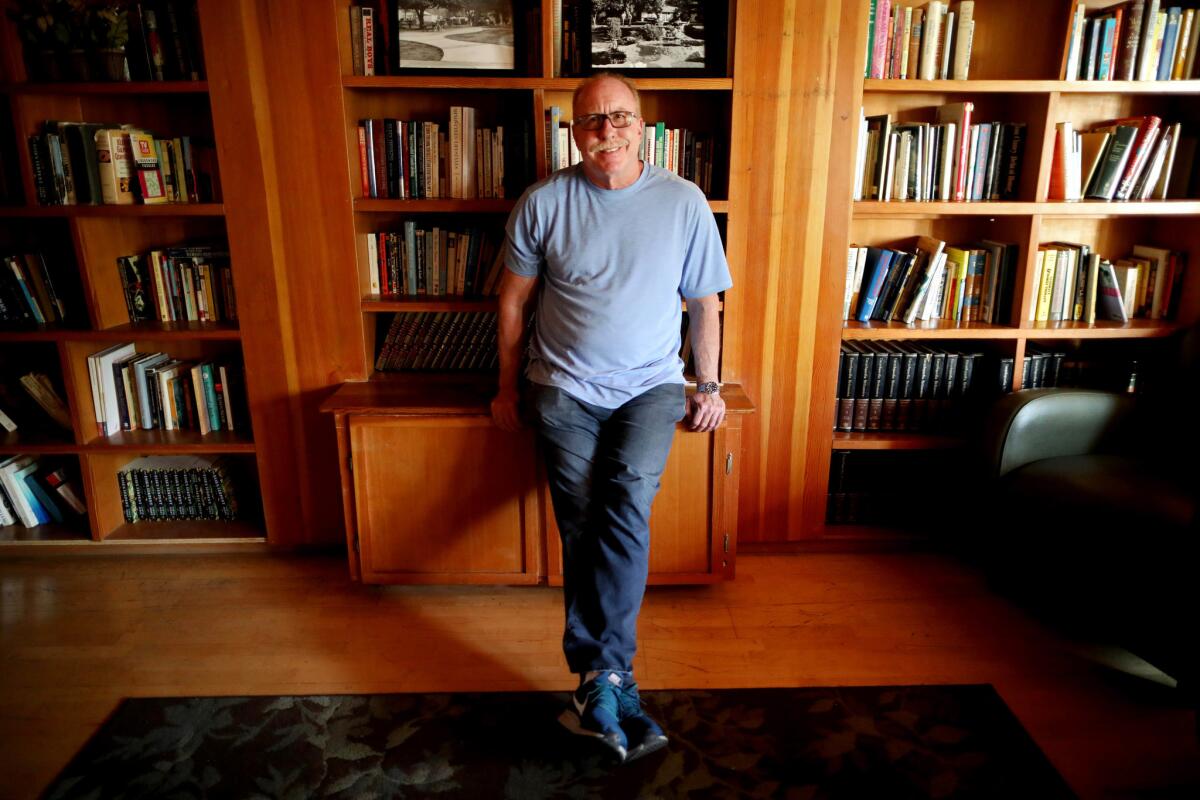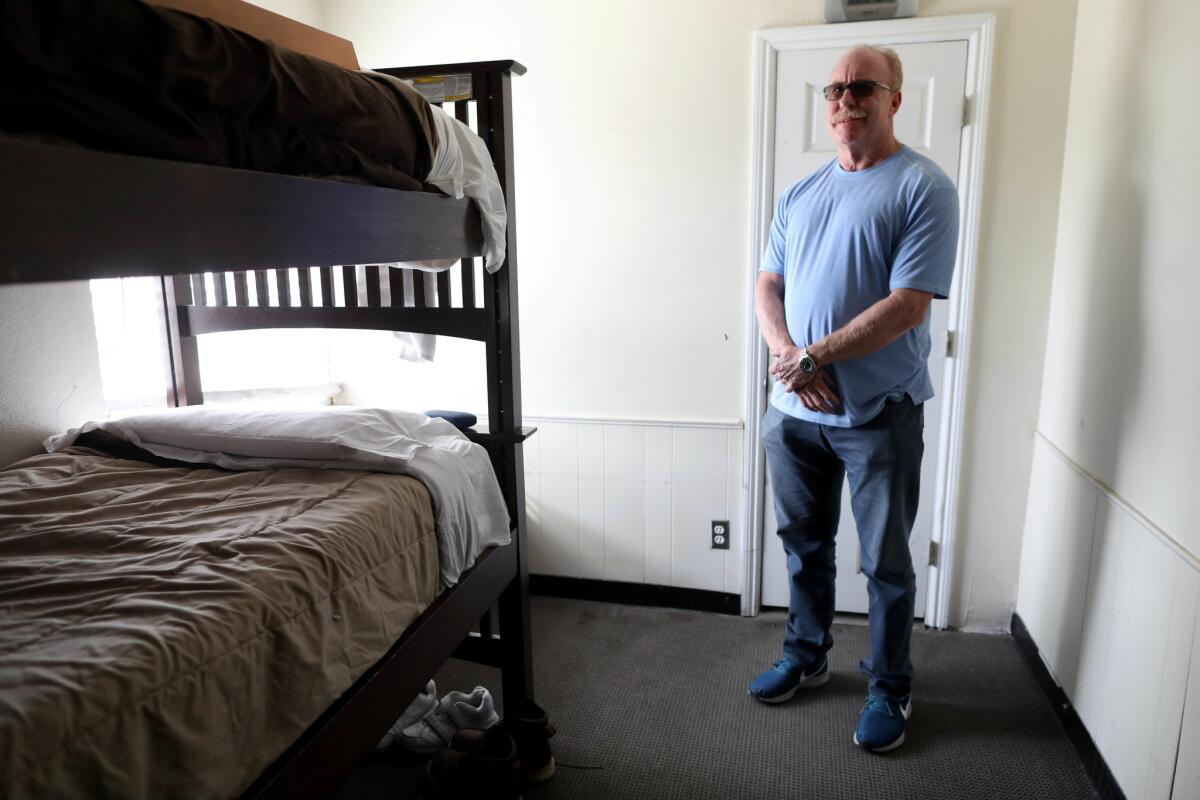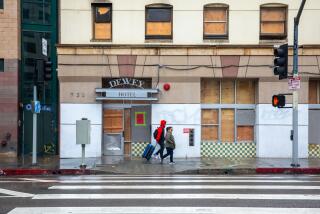Column: A onetime addict on skid row has something to say about the homeless problem

It was one of those digital town hall chats on social media, and the subject was one that impacts almost every neighborhood in Los Angeles — homelessness.
The conversation, by residents of Eagle Rock, Highland Park and southwest Pasadena, was fueled by a story my colleague Gale Holland wrote. She reported last weekend that despite spending $619 million in the last year, local officials believe little or no progress has been made to reduce the number of homeless people, which stands at greater than 50,000.
Comments in the social media forum ranged from exasperated to compassionate as residents debated causes and solutions. One writer was worked up about “vagrants” who’ve made bad choices others shouldn’t have to pay for. But the post that caught my eye offered an insider’s view.
“I live in San Rafael Hills, own a house, pay my taxes, walk my dog. And I’m an addict,” wrote Kevin Schick.
He revealed that he had been homeless for years, used to live on skid row, and was available to talk to any neighbors who’d like an education on things they “really don’t know about!!!!!!”
I took him up on the offer. In the latest data, poverty is a big driver of homelessness, especially in a region like ours where wages haven’t kept up with housing costs. But mental illness and addiction are also huge factors, and often, the two disorders team up and complicate efforts to get people housed. Tens of thousands of people were moved into housing last year, but their replacements keep stacking up on streets, under bridges and in river beds.
Schick invited me to meet up with him at the Impact Drug and Alcohol Treatment Center in Pasadena. It was there, in 2010, that he got sober after decades of drug abuse that began when he was a Santa Monica teen. Today, he is the center’s procurement director.
Schick, a tall 54-year-old redhead with a commanding voice, led me through Impact’s residential facility, which is a temporary home to 130 recovering addicts who come from jails, courts and the streets. And the waiting list of those who’d like to move in is long.
“From age 15 to 23 I was under the influence every waking minute of the day,” said Schick, who started with marijuana and then moved on to crack and other drugs. He said his absent father was an alcoholic, his mother worked and he took advantage of the situation, but paid a price.
“One day in front of a 7-Eleven in Hollywood I just started crying uncontrollably,” said Schick, who wanted to escape, but couldn’t. “I was homeless, basically. I’d get a job, get an apartment, but never keep anything for more than 30 days.”
Several rehab attempts failed, but the last time around, “I was willing to take the steps. The 12 steps. But I mean thoroughly … not playing around with it.”
He got clean and married another recovering addict who had made some good investments and lived comfortably. He sponsors dozens of addicts now, and says he knows he will always remain one himself. But today he feels free of what for many years had him firmly in its clutches.

“People don’t understand what an addict is suffering from,” Schick said. “Addicts or alcoholics form a physical craving beyond their mental control.”
He called the spread of homelessness a sad reality in “the wealthiest society there’s ever been on the face of the Earth,” and he wants people to think of addicts “as human beings” first and foremost. But don’t think that makes him a soft-hearted liberal.
Reduced penalties for drug offenses make it easier to keep using, Schick said, and so do handouts from well-intended people who want to help but end up enabling instead. Nobody kicks a habit, he said, without taking full personal responsibility.
“I blamed everyone else for my problems my whole life,” said Schick, speaking the language of recovery. “If only society had given me a break. If only I didn’t have red hair. If only my father wasn’t an alcoholic. Whatever the circumstances are in your life, you are not powerless over alcohol.”
That may well be true of the disease, but the absence of well-paying jobs and affordable rent can sabotage self-control and crush hope. We were visited in Schick’s office by clients who testified to that.
“When I was 22, I worked as a waitress and was going to school, and I was able to bank my paycheck and live off my tips,” said Jennifer, 63, a former Impact counselor who lapsed back into addiction last August and is a client now.
Jennifer said she paid $125 a month for a nice apartment back then, and later moved up to a rented home for $750. But every rental is out of reach to her now. She said she’ll be graduating to a sober living home in a few days, but noted that a lot of neighbors don’t want such places near their homes. And when she moves on from there, finding a good job and a place she can afford will be a puzzle. If she has to, she said, “I guess I can fit in my Honda Fit.”
I asked if she had considered moving to an area with a lower cost of living. Jennifer said it won’t be easy to leave her “recovery network” and start over in a place where she doesn’t know anyone.
“The rent is too high and the minimum wage doesn’t pay for things,” said Vicky, 61, who grew up in Nickerson Gardens and ended up on skid row. Drugs were so prevalent there it was hard to break the habit, and she ended up in jail more than once. Her plan is to get through Impact, study to become a counselor and move to Tennessee, where living is cheaper and she’s got family.
Christina Gonzales became a client 11 years ago after leaving her teaching job because of a drinking problem. She went from sleeping in her car, and in parks, to completing the Impact program and getting hired on as an administrator. Now she attends county meetings on homeless strategies and is a few weeks away from earning a doctorate in public administration.
“One problem I’m seeing now is that we don’t have enough beds,” said Gonzales. “We could open three treatment centers like this if we had enough availability.”
Schick said he doesn’t have all the answers to homelessness. But he knows that addicts need treatment, and they need to be ready for it, as he finally was. Affordable housing is an obvious need, he said, but housing without help won’t work.
“It’s a treatable illness, and we absolutely do recover,” he said.
“When I help my 82-year-old mom buy food, I pull her wine off the shelf and it could be lima beans. It has no emotional connection for me whatsoever. It doesn’t mean I’m cured. Not by a long shot. But I’m not dominated by the obsessions any more.
Twitter: @LATstevelopez
More to Read
Start your day right
Sign up for Essential California for news, features and recommendations from the L.A. Times and beyond in your inbox six days a week.
You may occasionally receive promotional content from the Los Angeles Times.







